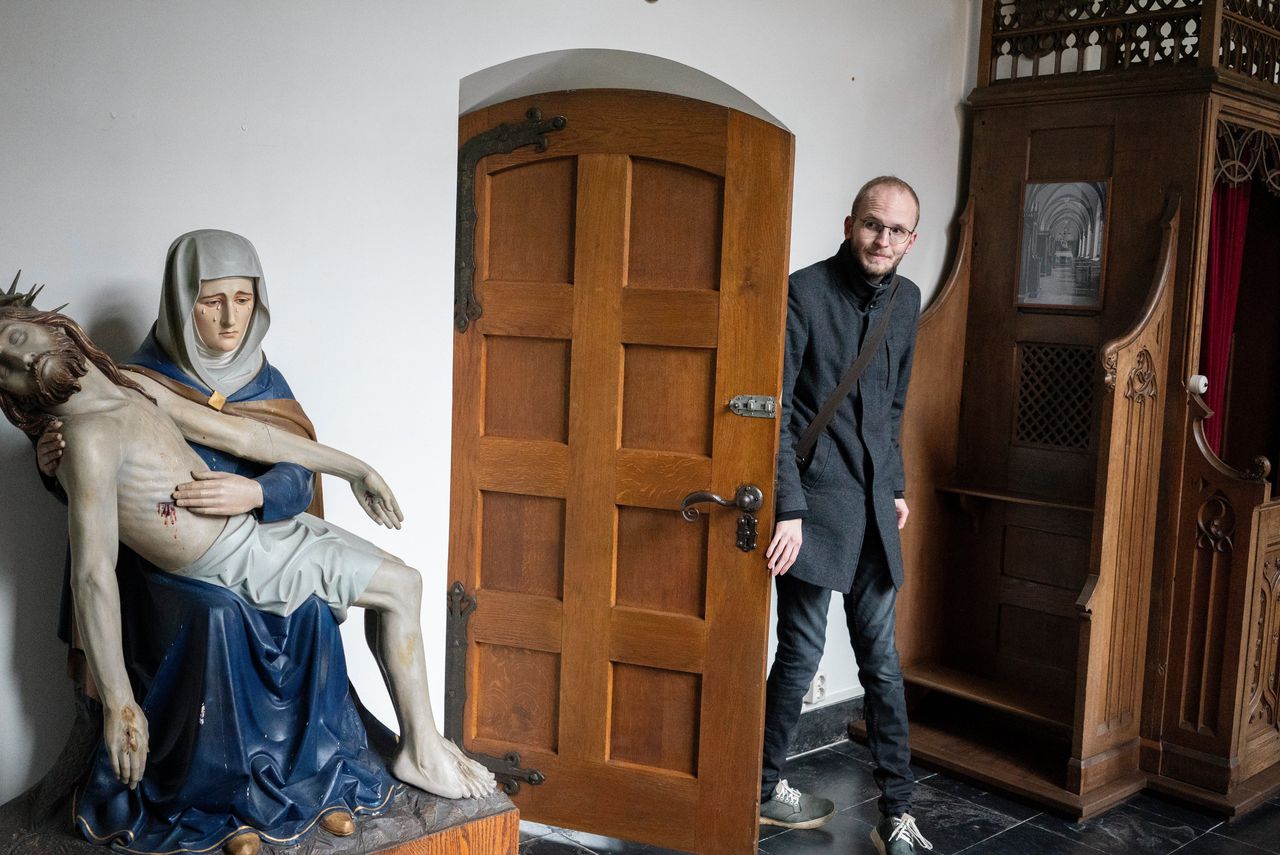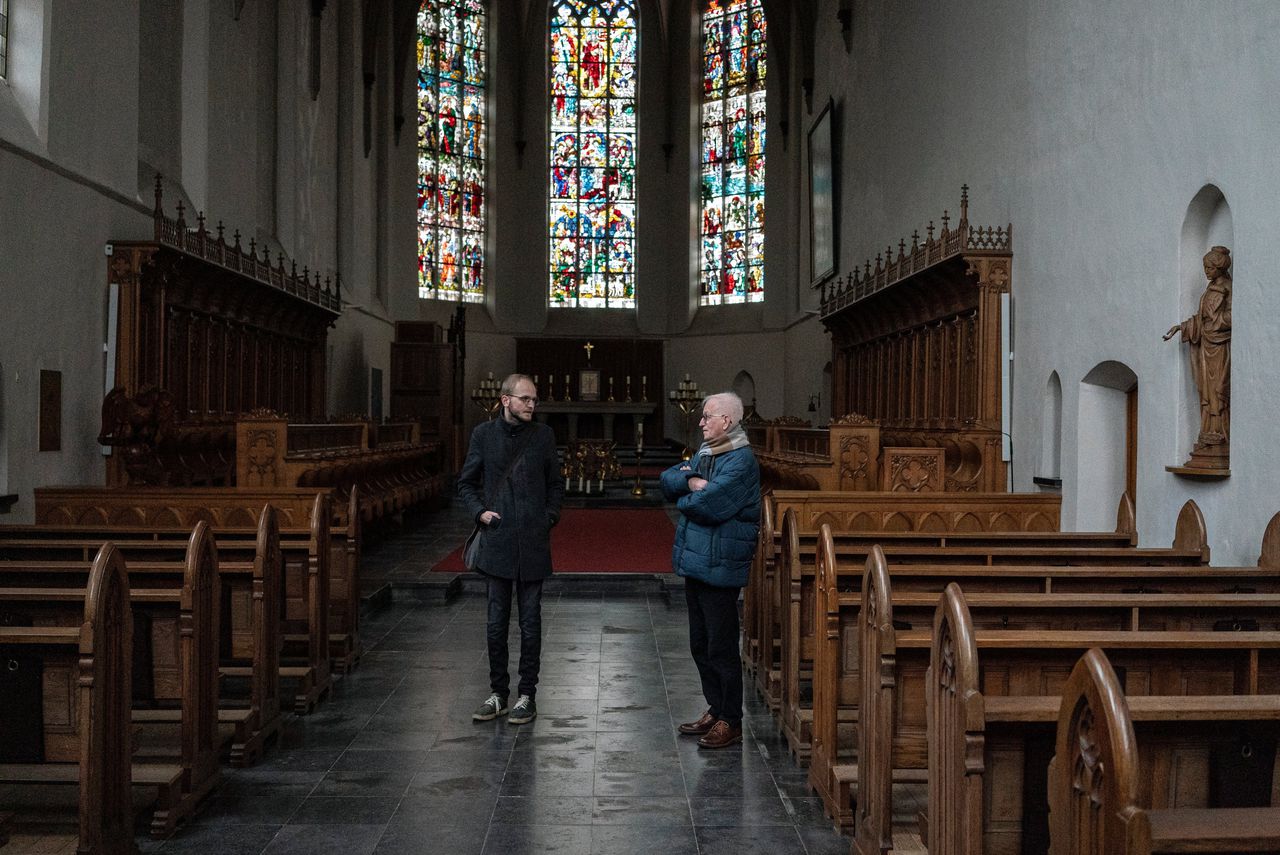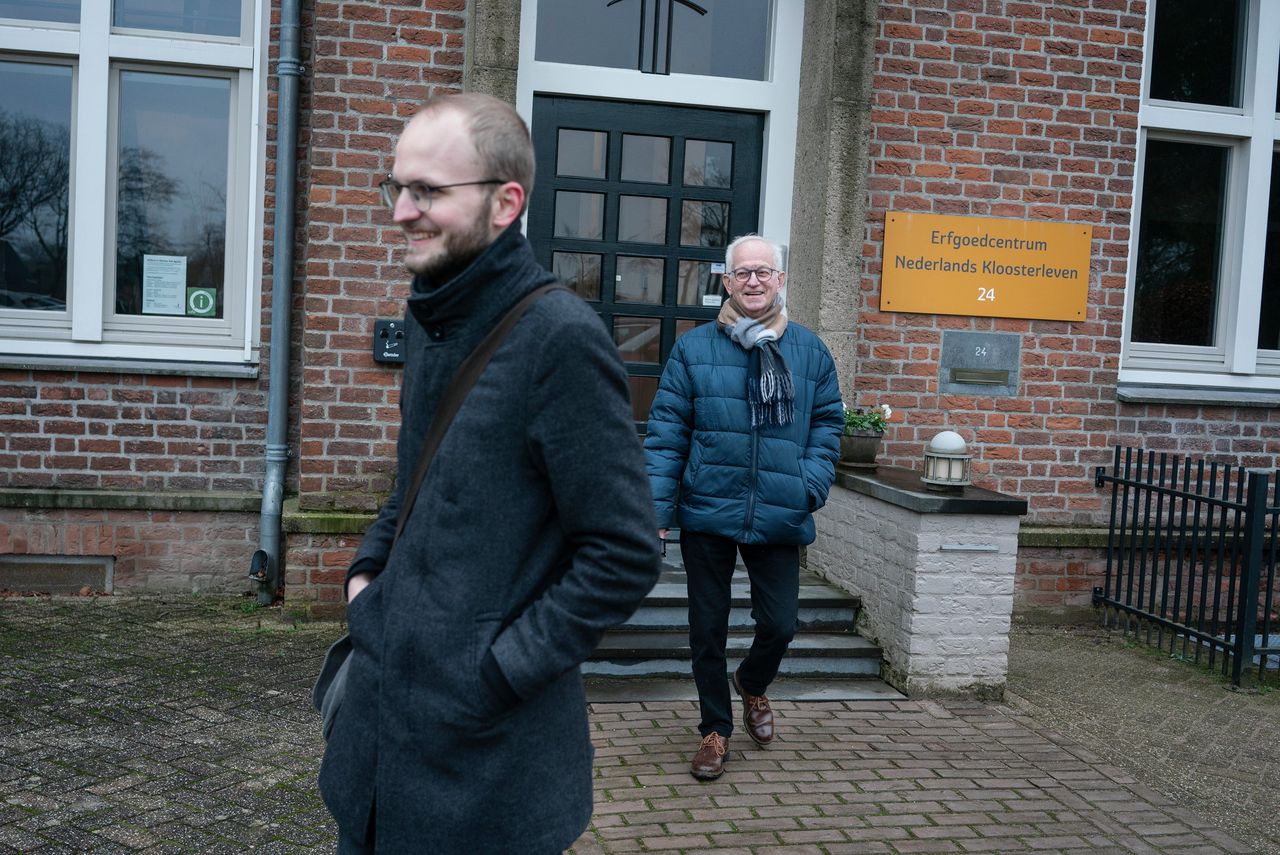Local history needs young people: 'We would never have come up with a pub quiz like this in the old board.'
%2Fs3%2Fstatic.nrc.nl%2Fwp-content%2Fuploads%2F2025%2F02%2F24112339%2Fdata127954960-e3fdbf.jpg&w=1920&q=100)
The sun shines in many colours through the stained glass windows of the monastery in Sint Agatha, on the Brabant banks of the Maas. The municipality of Land van Cuijk, at the crossroads of North Brabant, Limburg and Gelderland, breathes history. Prince Maurits van Oranje donated the stained glass windows of the chapel, the monastery wall is seven hundred years old, and less than two kilometres away lie the foundations of a Roman city.
But history buffs Stef Coenen and Pierre Aarts are not here for these fascinating old stories; they are interested in what falls outside the grand history. Such as the story of Wim and Marietje, two children who died together with a priest at the end of the Second World War, when a grenade exploded on the monastery grounds.
Associations that focus on local history – often called historical or local history societies – are struggling. There are members, but active board members are getting older. “Aging, no new members, insufficient volunteers and a lack of board members are common problems at board meetings,” sums up Henk Hellegers, chairman of umbrella association Brabants Heem.
The historical circle Land van Cuijk had the same problems, but found a solution. Aarts (78), chairman from 2010 to 2022, saw the circle bleed dry due to aging and the lack of new members. Coenen (25) brought renewal together with two friends. It created new interest from the community. The circle flourished and is healthier than ever.


Some of the more than five hundred historical societies in the Netherlands are still struggling to survive. Some groups find new members, other groups are kept alive by a single enthusiastic chairman. There are no hard figures, but Brabants Heem, with 127 Brabant local history societies under its wing, found the situation serious enough to start a working group for rejuvenation. They must come up with advice to attract new audiences.
Is it bad if these historical hobby groups stop? Yes, says Arjan Nobel, professor of public history at the University of Amsterdam. Their research is essential, also for academics. University researchers use these local stories for broader research goals. “As a university, we have to be very careful with the historical associations,” says Nobel. “There are parts of my research, such as digging through archives for genealogical data, that I simply cannot do without them because I don’t have the time.”
Amateur historians are enthusiastic, but often lack a framework, and then they tinker around on their own
In the days before the internet, a local history society was essential to be able to do historical research at all. Membership gave access to archives that would otherwise have remained closed. But now there are plenty of other ways to practice your hobby, says Nobel. "Bookstores are full of history books, there are countless history programs on TV and archives are available with a click of the mouse." A local history society can provide the necessary guidance, explains Arnoud Jan Bijsterveld, special professor of Culture in Brabant at Tilburg University. "Amateur historians are enthusiastic, but often lack a framework, and then they tinker around a bit on their own."
YoungstersIn Land van Cuijk, they also noticed the consequences of the increased social pressure on volunteers. Between 2005 and 2020, the number of members dropped from around 250 to around 150, in a merged municipality with 90,000 inhabitants. "I thought we would eventually go under," says Pierre Aarts, chairman from 2010 to 2022, sitting at the kitchen table of Stef Coenen's parents. "When I joined in 2010 as a 64-year-old, I was one of the youngsters," Aarts laughs.
But in 2020, the then twenty-year-old Coenen, together with his good friend Joep Baltussen, joined the board. Aarts: "That was a breath of fresh air." Two years later, Coenen was editor-in-chief of the magazine and Baltussen chairman of the circle. In the meantime, the number of members has increased again to 250. A third friend, Thijs, also joined.
Coenen: “During the corona period I often walked with Joep, and the conversation always ended up on the historical circle; what could be done differently there and how we would do it. We just made each other enthusiastic, and decided to go for it.”

The youngsters tackled the circle vigorously. The new website and design of the magazine are the most striking. But they think differently across the board. Topics in the magazine are more relevant to new generations, such as a special about underexposed women in the region. Meetings that were always held on Thursday mornings now take place at times when working people can attend. Activities have been expanded; in addition to lectures, there is now also a pub quiz. Aarts: "We would never have thought of such a quiz in the old board."
The youngest member of the board is now nineteen. Coenen: "We actively recruit on Facebook, targeting young local people who study history." A pub quiz may not be as educational as a lecture, but that shouldn't be a problem, says Coenen. "Ultimately, we're just a social club."
HeritageAnd it is precisely this convivial aspect that seems to be the salvation of local history. In 2005, a treaty was drawn up in the Portuguese city of Faro that emphasizes the social, societal and connecting value of heritage. In 2024, the Netherlands also signed this treaty.
“Heemkunde is a perfect example of the value of heritage,” says Patrick Timmermans of Erfgoed Brabant. “In the Netherlands, we have the idea that everything old has to be put under a bell jar. You should definitely keep your hands off it. If we continue to do that, heritage will die a sad death. Heemkunde has an active relationship with heritage. That is what keeps our past alive.”
Professor Bijsterveld agrees. In addition to the social contact of meetings and lectures, such a group can contribute to local identity. "Heemkunde connects people with the place where they live, and the people they live among. Your personal past is part of your identity, but so is your group past."
We were already invited by a councillor to come and talk to them. For example, they asked us for advice on the new municipal coat of arms
"We are a bit like the archivists of the municipal past," Stef Coenen adds. He gives an example. In 2022, five municipalities, with 33 villages, came together in a new municipality: the Land van Cuijk. "We were already invited by an alderman to come and talk to them. For example, they asked us for advice on the new municipal coat of arms."
Eppo Bruins, Minister of Education, Culture and Science, plans to ratify the Faro Convention during this cabinet period, a spokesperson for the ministry told NRC . A heritage policy was also drawn up in 2024 with the "idea of the Faro Convention as a source of inspiration".


New policy is urgently needed, says Tilburg professor Bijsterveld. "Up until now, the government's policy has been truly terrible. There has been a huge demolition of subsidies and appreciation over the past 25 years." Erfgoed Brabant was also cut in 2023. Ten percent of the budget disappeared. The cuts led to the elimination of a chair for dialect research at Tilburg University. At Erfgoed Brabant, the regional language consultant was also cut. This meant the disappearance of professional support for amateur research into regional languages. The local history circles are the only ones left.
But besides the government, the academic world should also play a bigger role, says UvA lecturer Arjan Nobel. "The gap between academics and amateur historians is growing. Everything in the academic world is international. If it doesn't appear in a peer-reviewed journal, there is no interest. The more we write about international history, the less attention there is left for a small village somewhere in Utrecht."
In the monastery garden in Sint Agatha, Coenen and Aarts pause at the air raid shelter. A black metal memorial plaque will ensure that people will remember the 'great' history of the Second World War for a long time to come. The historical circle Land van Cuijk also keeps alive the memory of victims Wim, Marietje and Father Odulf and the time when "it was rumbling and rattling in the monastery".
Read also
'The local bookstore as a social institution is disappearing'/s3/static.nrc.nl/bvhw/files/2020/05/data58168879-e5f1a0.jpg)
nrc.nl


%2Fs3%2Fstatic.nrc.nl%2Fwp-content%2Fuploads%2F2025%2F02%2F24160809%2Fweb-2402LEV_meindert_a.jpg&w=3840&q=100)
%2Fs3%2Fstatic.nrc.nl%2Fimages%2Fgn4%2Fstripped%2Fdata128546410-acbe49.jpg&w=3840&q=100)
%2Fs3%2Fstatic.nrc.nl%2Fimages%2Fgn4%2Fstripped%2Fdata128537820-912548.jpg&w=3840&q=100)
%2Fs3%2Fstatic.nrc.nl%2Fwp-content%2Fuploads%2F2025%2F02%2F24185334%2Fweb-2402BIN_rechtbank.jpg&w=3840&q=100)
%2Fs3%2Fstatic.nrc.nl%2Fimages%2Fgn4%2Fstripped%2Fdata128534538-112265.jpg&w=3840&q=100)